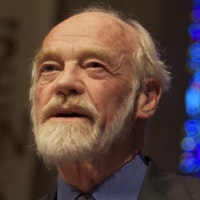Prayers Are Tools
Topic: Spiritual Growth & Practice
Prayers are tools not for doing or getting, but for being and becoming.
Eugene Peterson, the late revered teacher and interpreter of the Bible, held a profound understanding of the purpose of prayer. “Prayers are tools not for doing or getting, but for being and becoming,” he once reflected. His pastoral ministry spanned nearly three decades, a setting where one might discover worn volumes by writers such as Wallace Stegner or Denise Levertov subtly mingled with sacred texts.
Peterson's quiet discontent with the limited manner his congregants engaged with the Bible led to a significant undertaking. Disrupting the passive reading habits, he dove into the extraordinary task of rendering the entire Bible into a more accessible language. His translation, which resonated deeply with millions worldwide, became an instrumental force in shaping the perspectives of pastors, teachers, and readers across generations.
The subtlety of Peterson's faith was grounded in a heartfelt fondness for metaphor and a steadfast commitment to the poetry inherent in the Bible. To him, these were not mere literary devices, but the essence that invigorated the Scriptures, enabling them to resonate in a world that often seemed disconnected. This ethos was carried forward in his vast literary contributions, including over 30 books such as Answering God and The Message: The Bible in Contemporary Language. Even after his passing, Peterson's voice continued to echo in works like This Hallelujah Banquet: How the End of What We Were Reveals Who We Can Be, a Lenten sermon series published posthumously in 2021.
Eugene Peterson passed away in 2018, leaving behind an enduring legacy. His son, Eric, himself a pastor near Spokane, Washington, tenderly remembered his father, “He remained gentle and humble right up until the end of his long life and was simply the holiest man I’ve ever known. In death no less than life, he is a person of grace and truth.” In the stillness left by Peterson's passing, these words serve as a poignant testament to the enduring impact of his life, both in his personal sphere and in the broader world of biblical interpretation.
Pastor Eugene H. Peterson [The Pastor: A Memoir].

Eugene H. Peterson
Theme: Prayer


Answering God—Eugene Peterson with Krista Tippett [Transcription by Heather Wang]
Excerpts From Interview
Additional Eugene H. Peterson Quotes
Resources
Related Quotes
Copyright © 2017 – 2026 LuminaryQuotes.com About Us